Crisis and Culture
As we look at the world around us, we see a constant shift in our ideals, motives, and influences. Technology advances at an incredible pace, while the global leaders of industry are far from professing Christ as King. One example is Apple, the world’s biggest company by market capitalization, valued at $3.181 trillion as of June 24, 2024. The company’s logo, featuring a bitten apple, alludes to the story of Eden and temptation, whether intentionally or not. It serves as a reminder that the desire to know everything—just as Adam and Eve experienced—only leads to grief.
However, as Christians, we can take what the world gives us and use it for good. In his famous book Christ and Culture, theologian Richard Niebuhr outlined five paradigms for how Christians engage with culture. Of these, he favored “Christ the transformer of culture.” This model encourages Christians to use the culture to bring about positive change, rather than fleeing from it or adopting it wholesale. In today’s world, we must resist the crisis of sin while seeking to influence the culture for good.
1. The Crisis
The crisis is sin, which brings forth more sin. The descendants of Adam illustrate this cycle. Josephus recorded that Adam had 33 sons and 23 daughters, yet even among his descendants, sin was rampant. Cain, having murdered his brother, became a wanderer in the land of Nod. Despite being away from God’s presence, Cain built a city (Genesis 4:17). His descendants expanded human civilization but also furthered the rebellion against God.
The truth remains that “our hearts are restless until they find their rest in God,” as Saint Augustine of Hippo said. Cain’s heart was restless, and so are ours, until we return to our Creator.
2. The Culture
Cain’s descendants, despite their distance from God, made significant contributions to human culture. Jabal developed animal husbandry (Genesis 4:20), Jubal created musical instruments (Genesis 4:21), and Tubal-Cain worked with bronze and iron (Genesis 4:22). These achievements reveal that even unbelievers can understand and manipulate the world as God established it, though they may not acknowledge Him as the ultimate source of these blessings.
Polygamy is first introduced in this passage through Lamech, a descendant of Cain. Lamech’s two wives, Adah and Zillah, represent a dishonoring of God’s established order for marriage (Genesis 4:19). Lamech also boasted of committing a greater sin than Cain’s, believing himself justified in exacting harsher judgment than God (Genesis 4:23-24). This culture of pride and self-righteousness is a warning to us today.
In many ways, modern culture continues to follow the same patterns. Beauty is idolized, pride is exalted, and violence is justified. Yet, even in the midst of this, we are called to stand firm. The Bible teaches that we are not to conform to the world but to be transformed by the renewal of our minds (Romans 12:2).
3. Redeeming the Culture
Christians have always made use of culture to advance the Gospel. D.A. Carson notes that even the most radical Christians inevitably engage with their cultural surroundings. This is seen throughout history, whether through the development of Christian art, music, or technology. We are called to take the good from the culture and use it for God’s glory.
One startling statistic highlights the importance of redeeming culture within the family. According to data from Promise Keepers and Baptist Press, if a father does not attend church, only 1 in 50 children will become regular worshippers. However, if a father is the first in the family to become a Christian, there is a 93% probability that the entire household will follow. Fathers play a crucial role in shaping the spiritual culture of their families.
Conclusion
The birth of Enosh, the son of Seth, marked a turning point in human history. At that time, “people began to call on the name of the Lord” (Genesis 4:26). This is the response we are called to today: to reject the crisis of sin and to redeem the culture by calling on the name of the Lord. Though the world around us may be in constant flux, we can rest in the unchanging nature of God, who alone brings true peace.
Footnotes:
- Quote from Augustine of Hippo, Confessions, Book I, Chapter I.
- Christ and Culture by Richard Niebuhr, first published in 1951.
- Statistics from Promise Keepers and Baptist Press, accessed through Baptist Press archives.

